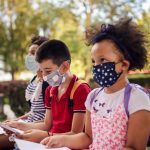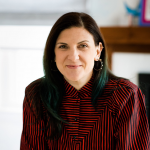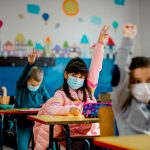Summer school programs help children get better at both reading and mathematics. Students who attend summer school tend to have higher test scores than those who don’t, which means that offering voluntary summer programs is likely to help students catch up from pandemic-related learning slowdowns. And summer learning programs may also improve outcomes beyond test scores, such as by helping students to recover course credits.
“Summer school programs help children get better at both reading and mathematics. Students who attend summer school tend to have higher test scores than those who don’t, which means that offering voluntary summer programs is likely to help students catch up from pandemic-related learning slowdowns,” says Kathleen Lynch, an assistant professor of learning sciences at UConn’s Neag School of Education.
“The visits to UConn are really important to the students taking UConn classes for credit in high school,” says Brendan Wilkosz ’03 (ED), ’04 M.Ed., who has been at Berlin HS since 2004, and teaches a chemistry class that grants UConn credit through the ECE program. “There can be a disconnect for the students if they are physically separated from UConn. This year, that was not possible, but it was important for me to do something, so we worked on a virtual day. There was a real willingness at UConn to get that done to have students experience the challenges and complexities of the work, but also see that the research is cutting edge.”
Sarah Woulfin, an associate professor at UConn’s Neag School of Education, said she prioritized students’ humanity during the pandemic, which she hopes will continue. “I am somewhat optimistic that this will stay in a certain way and perhaps in certain pockets,” she said.
Sandra Chafouleas, a professor at UConn’s Neag School of Education and co-director of the UConn Collaboratory on School and Child Health (CSCH), said that all schools need to make learning joyful and emphasize relationships, flexibility and a focus on the whole child. Most importantly, Chafouleas said, schools needed to invest in building teacher-student relationships. She said that just one teacher could make an enormous difference in the path of a child.
“Teachers have new fluency and technology,” says Michael Young, who coordinated the educational technology program at UConn’s Neag School of Education. “Students have new fluency. Society and legislatures have a sense that this is doable now, because we did it for a year.”
The pandemic has presented a variety of different challenges, many of which are exhausting to cope with. The University of Connecticut’s Alumni Relations hosted a panel titled “Not Burnout, Betrayal: The Pandemic’s Impact on Working Mothers.” Panelists, along with an array of other women, discussed various struggles that mothers are facing today.
“As many schools in the U.S. figure out how to safely and fully resume in-person instruction, much of the focus is on vaccinations. But there’s another type of ‘vaccine’ that may be beneficial for some returning K-12 students that could be overlooked. Those are known as ‘behavioral vaccines.'”
“As many schools in the U.S. figure out how to safely and fully resume in-person instruction, much of the focus is on vaccinations,” says Neag School Board of Trustees Distinguished Professor Sandra Chafouleas. “But there’s another type of ‘vaccine’ that may be beneficial for some returning K-12 students that could be overlooked. Those are known as ‘behavioral vaccines.'”
Says UConn’s Rachael Gabriel, associate professor of literacy education: “Since schools shut down, students have been called the ‘hobbled’ generation and the ‘Covid class.’ They have been told they have or will experience Covid-related slides, losses, gaps, and other deficiencies that are ‘disastrous’.”
She’s quick to add: “They should be told the opposite,” considering the challenges they have faced and the learning adaptations they have made.



